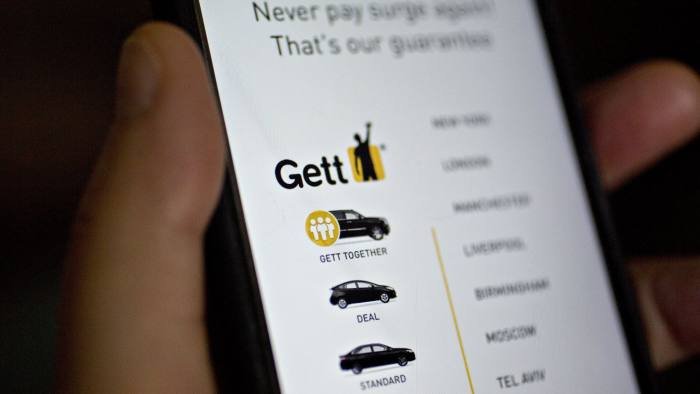Uber completed its IPO last Friday at a disappointing valuation of $82 billion. As if that were not enough, the company's share price plummeted 8% on its first day of trading. While recurring concern about the trade war affected the stock market and probably accounted for Uber's poor performance, this is not really the whole story. Questions have repeatedly arisen in recent weeks about the business model of shared ride companies, headed by Uber and Lyft: whether they can make a profit, what their interface with other forms of transportation should be, and how dependent they are on autonomous vehicles.
The same questions apply to Israeli company Gett, which last Tuesday announced a $120 million financing round involving shares and debt. Gett said that the round would supply it with the cash it needed before its IPO, which is being planned for the end of the current year or next year. The company said that its financing round had been at a valuation of $1.5 billion.
Do the IPOs of Uber and Lyft and their financial results give any indication of Gett's value and the route it should take - IPO, a sale of the company, or continuing as a private company? Gett chose a different strategy, but the skepticism among investors about the market in which it operates is scarcely encouraging.
Gett's new strategy includes a focus on making a profit in the coming year (excluding exceptional research and development expenses). Sources close to Gett denied that the change in strategy was motivated by the company's difficulties in raising capital. The current financing round, even though it consisted partly of debt, still reflects some kind of confidence. Keep in mind, however, that debt is mainly an expression of confidence in the ability to repay it, not necessarily in the company's ability to increase its value.
Gett chose to focus on growth in its current markets because entering new markets incurs high expenses for marketing and for attractive offers to drivers. There is no reason that Gett should not succeed in this, because it is very difficult to topple a company that leads in each of its markets. This means, however, that Gett's growth potential is limited.
Investors are expressing concern about Uber and Lyft's respective annual burn rates of $3.7 billion and $900 million. In a different world and a different market, Gett's profit strategy could help it with investors in the public market, but it only seems that way. In practice, investors prefer rapid growth, even at the expense of the bottom line. At Amazon, it worked for years. The reason that investors are worried about Uber, which likes to call itself the "Amazon of transportation," is the stubborn competition in the market, which threatens all of the companies in it. Amazon never had to face such competition; it posed a threat to the conventional retailers.
Gett gave up on the last kilometer
Uber and Lyft want to create a "platform" for transportation in general: not just taxis, but anything that people use to get from one place to another. They cannot replace cars, but they can offer a platform with e-bicycle and e-scooter rental services. People who use public transportation instead of taxis can still use Uber and Lyft for the last kilometer to their destination.
Gett has chosen, at least up until now, not to include e-bicycles and e-scooters in its service. It has created a delivery service, which appears to be a success so far, and a platform for shared rides. Will this policy hurt the company or help it? It is hard to tell. The company has created new growth engines for itself, but the users for them are not necessarily the same users. Uber and Lyft are trying to reach every user traveling on public transportation. Gett is not. If I had to bet, I would bet that this strategy will not work in Gett's favor, because it diminishes and limits the company.
Selling the company as a solution
Gett is talking about an IPO, but it has to admit that the selection of a profit strategy is reminiscent of statements by soccer club managers about a "year of consolidation" when they realize that the team is going nowhere this season. The choice of a strategy that, however esteemed, runs counter to what prevails in Silicon Valley appears to be a strategy for marking time: before an IPO, according to the company, or perhaps before a sale of the company.
It is difficult to compete against a company that dominates a given city, although it is possible to detract from its profit margins. Gett could therefore be a candidate for an acquisition by Uber, Lyft, or other companies active in the market. The Bloomberg website reported six months ago that Gett was searching for a buyer, but the company denied it.
Another element to be taken into account is the likelihood of Gett attaining a high company value in an IPO, especially in view of the disappointments of Uber and Lyft and in general, those of unicorns that failed to obtain a high value in their offerings. If the two companies' share prices do not recover, Gett is unlikely to provide a positive surprise. In any case, the company took a risk by foregoing any attempt to grab shares in new markets, in the hope that its new growth engines will compensate for it. The ideal scenario of the company's managers is unclear, but it can be said that it will be difficult to achieve.

